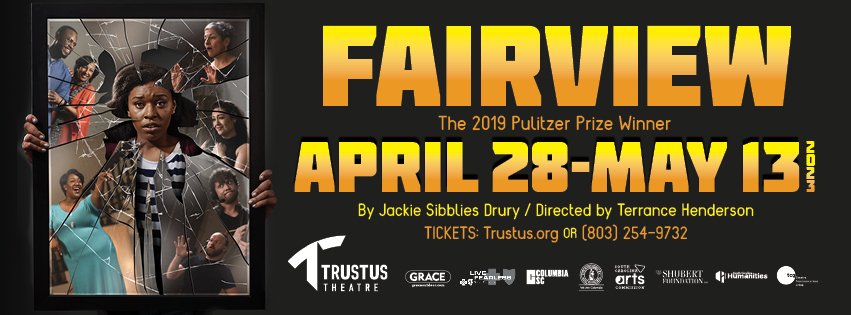So as not to “bury the lede,” this show must be seen. By everyone. More than once.
I went into Trustus Theatre’s production of Fairview with no expectations. I knew nothing about the script, except that it had a brilliant cast and director. What I got in return was one of the best productions and some of the best performances I’ve ever had the pleasure of witnessing.
Fairview has multiple definitions here. You can’t pick just one.
The play opens in the dining room of an upper-middle class family. Beverly, played by Marilyn Matheus, is preparing a dinner party to celebrate her mother’s 80th birthday. The rest of the family trickles in, some to help, some to hinder. Dayton, Beverly’s husband, Beverly’s sister, Jasmine, and Beverly & Dayton’s daughter, Keisha. It’s a pleasant, unassuming scene. (I was reminded of the Huxtable family). This is the easiest act to discuss.
Beverly is obsessed with the perfection of this dinner. More than once (or twice or thrice) she mentions she wants the evening to go well. The relationship between Beverly and her husband, Dayton, is charming. Dayton is sweet, flirty, supportive, and playful. Their affection for each other is evident, though there are numerous opportunities for Dayton to fail (intentionally and unintentionally) at some of Beverly’s requests for assistance. Jasmine, Beverly’s sister, joins the party. If Beverly is the “responsible” sister (and she absolutely is), then Jasmine is the “fun” sister. (She’d rather not admit it, but Jasmine is a bit envious of Beverly). The energy, the banter, the spirit of these three characters is infectious. Keisha, Beverly, and Dayton’s daughter, appears and that energy goes through the roof. A high school senior with a bright future ahead of her, but she’s less than excited at the prospect. The path laid out for her is not necessarily the path she would choose. So far, so…. Comfy and cozy.
Scene change. Except that the scene is exactly as the opening, sort of. This time, however, the cast members go through the identical motions but are pantomiming the scene. Their voices are not heard. Instead, the onstage scene is overlaid by the voices of individuals giving commentary about race and how those very white voices perceive it. The repeated question in this commentary is “if you could choose to be a different race, what race would you be?” The answers are cringe-inducing. Every stereotype/assumption/contradiction you’ve ever imagined is tossed about. I was embarrassed by the fact that comments such as those were being spoken aloud. The effect was one of watching a television show or movie and having people around you speak over the action.
Scene change. In which the disembodied white voices of the previous scene appear as caricatures of Black individuals, specifically Mama (Grandmother) and Tyrone, Beverly’s brother. The dinner party grows increasingly surreal, even absurdist. The pace, the energy, gets faster and faster and culminates in a bizarre food fight.
Keisha, watching in amazement/horror from the sidelines, stops the madness. And I can’t really tell you anything else or it spoils the ending. Suffice to say the watcher becomes the watched.
Exhausting. Provocative. Uncomfortable. This Pulitzer Prize winning piece takes a hard look at racism, family, privilege, and racial perspective.
Terrance Henderson’s direction is ferocious, and his casting impeccable. There wasn’t a weak link anywhere. Marilyn Matheus (Beverly) brings strength and insight to every role she plays. Deon Turner (Dayton) continues to grow from strength to strength in every show in which he’s cast. Katrina Garvin plays Jasmine to tipsy, smart-mouthed perfection. Rayana Briggs’ energy and intensity, from her entrance to show’s end, is electric. Ilene Fins, Brandon Martin, Katie Mixon, and G. Scott Wild all bring strong thought-provoking performances to the story.
Fairview runs May 4 through 7 and May 11 – 13. The May 7 show is a 2:00 p.m. matinee, other performances begin at 8:00 p.m. Talkback sessions will take place after the May 7 and May 11 performances. A grant from the NEA has been used for training sessions and support for the cast and crew.
Housekeeping: The show runs nearly 2 hours without intermission. I promise it won’t feel like it.
Libby Campbell
Jasper Magazine Theatre Editor




